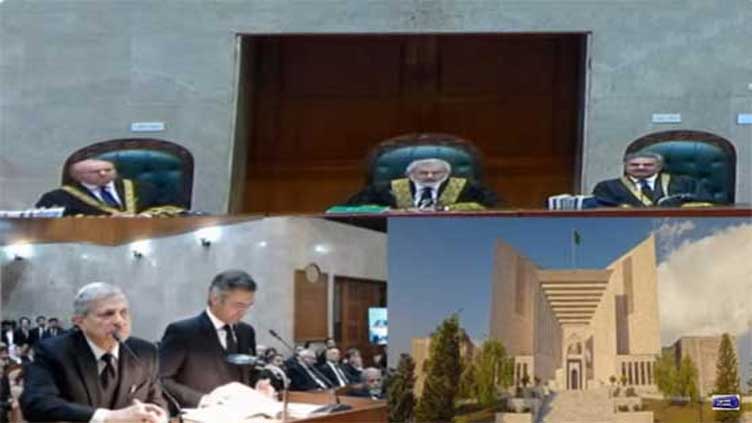F.P. Report
ISLAMABAD: Chief Justice of Pakistan (CJP) Qazi Faez Isa on Wednesday said that an “attack of any kind” on the judiciary’s independence would not be tolerated.
He made the remarks as the Supreme Court took up a suo motu case pertaining to allegations made by six Islamabad High Court (IHC) judges regarding interference by the country’s security apparatus in the judicial affairs
A seven-member bench — comprising Chief Justice of Pakistan (CJP) Qazi Faez Isa and justices Syed Mansoor Ali Shah, Yahya Afridi, Jamal Khan Mandokhail, Athar Minallah, Musarrat Hilali and Naeem Akhtar Afghan — is presiding over the hearing. The proceedings are being live-streamed on the SC’s website and its YouTube channel.
Last week, it emerged that six Islamabad High Court (IHC) judges — out of a total strength of eight — wrote a startling letter to the Supreme Judicial Council (SJC) members, regarding attempts to pressure judges through the abduction and torture of their relatives as well as secret surveillance inside their homes. The letter was signed by judges Mohsin Akhtar Kayani, Tariq Mehmood Jahangiri, Babar Sattar, Sardar Ejaz Ishaq Khan, Arbab Muhammad Tahir and Saman Rafat Imtiaz.
A day later, calls emerged from various quarters for a probe into the investigation, amid which CJP Isa summoned a full court meeting of the SC judges. On Thursday, Prime Minister Shehbaz Sharif met CJP Isa, where the two decided to form an inquiry commission, which was later approved by the federal cabinet.
However, lawyers and civil society members — in a joint letter — had urged the top court to take “cognisance of the matter in its jurisdiction under Article 184(3) of the Constitution as this issue eminently relates to public interest and to the enforcement of fundamental rights”. On Monday, ex-CJP Tassaduq Hussain Jillani — tasked to head the one-man inquiry commission — recused himself from the role, urging Justice Isa to “resolve the issues raised in the letter at the institutional level”. At the same time, the top court took suo motu notice of the matter and constituted a seven-member bench to hear the case.
A day ago, Barrister Aitzaz Ahsan and the Lahore High Court Bar Association (LHCBA) filed separate but similar petitions to join the suo motu proceedings. During Wednesday’s hearing, Attorney General for Pakistan Mansoor Usman Awan appeared before the SC along with Hamid Khan, who was present as ex-premier Imran Khan’s counsel. Ahmed Hussain appeared as Aitzaz’s lawyer.
At the outset of the hearing, Hamid informed the court that he had requested to be made a respondent in the case. At this, CJP Isa remarked, “Gone are the days when it was the chief justice’s will. We have constituted a committee to fix cases [for hearing].” He noted that the court had not received Hamid’s petition, adding that the committee would decide on the matter once the plea was received.
The CJP further said it was “inappropriate” that petitions were reported in the media before they were even filed. “When we talk about pressure being exerted, is this also exerting pressure on us in a way?” he wondered, adding that he never gave in to anyone’s pressure. The top judge also expressed his displeasure at lawyers calling for a suo motu notice: “The lawyers are saying to take a suo motu [notice]; then they should leave their practice.”
Justice Isa said that Hamid could not be considered a “representative of lawyers” as the president of a bar association was already present for that role. AGP Awan then read out the press release issued by the top court after the meeting between the CJP and PM Shehbaz on March 28.







